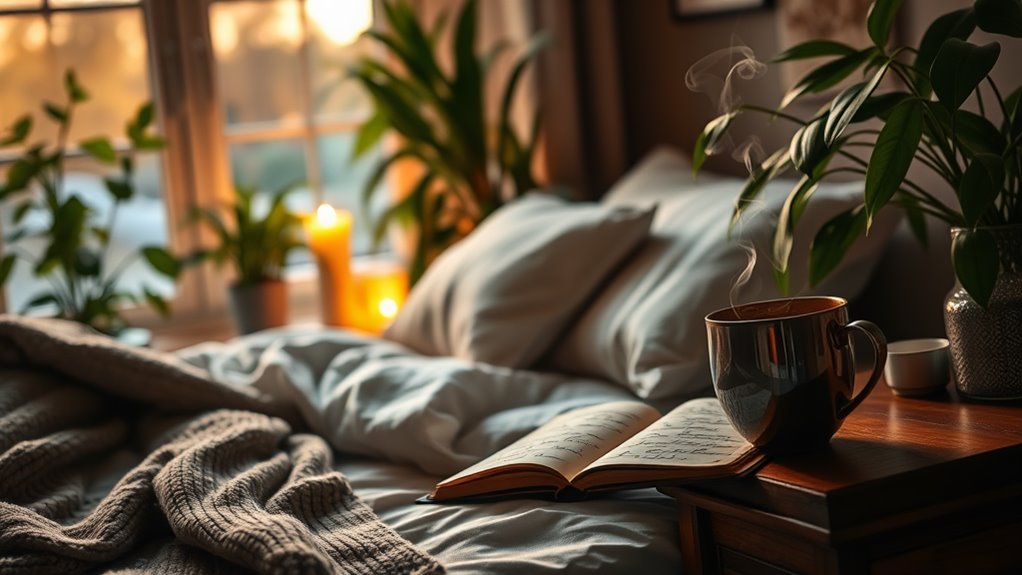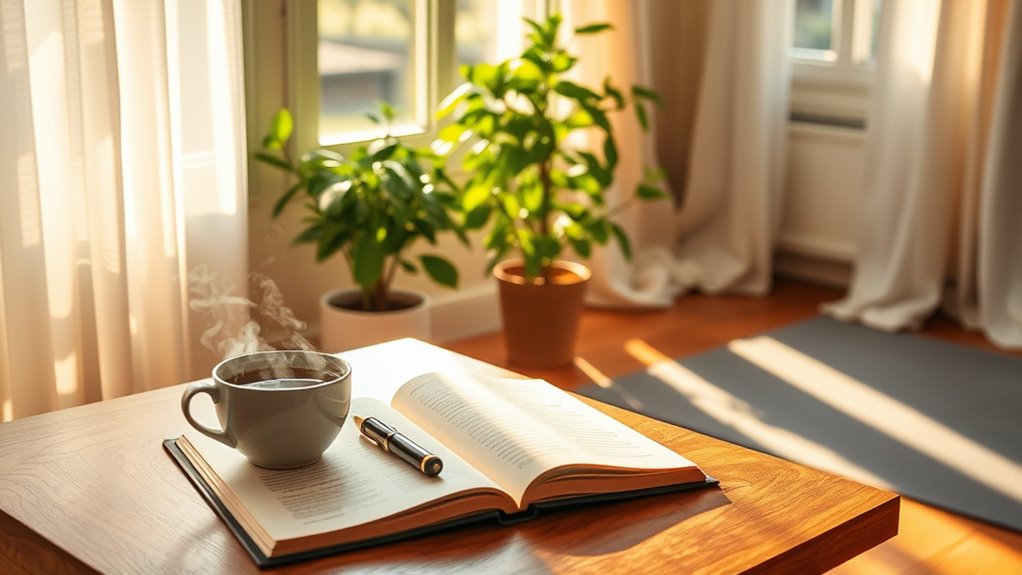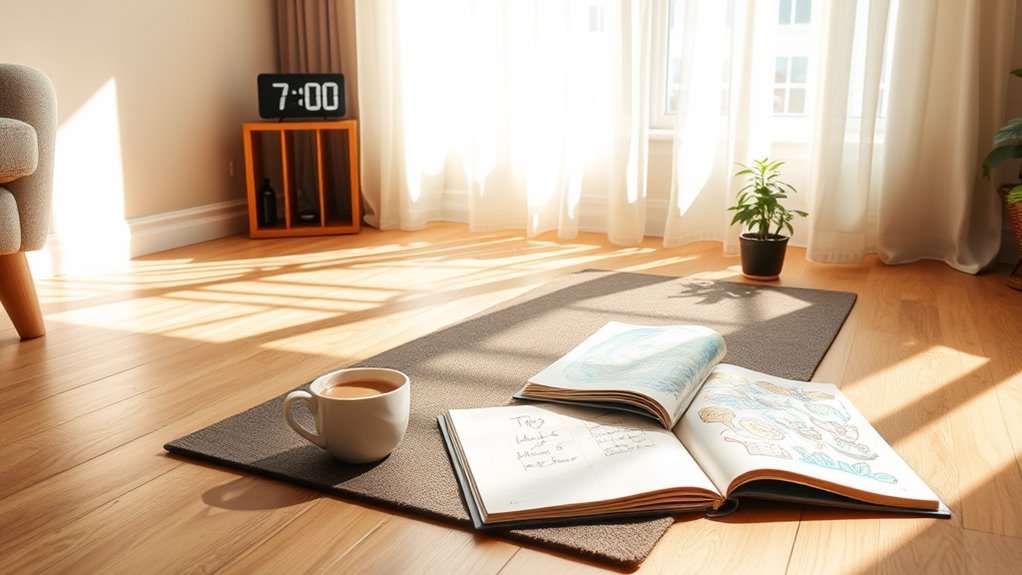The Secret to Sleeping Better- A 10-Minute Pre-Bedtime Routine
To sleep better in just 10 minutes, start with a calming pre-bedtime routine. Dim the lights and avoid screens to signal your brain it’s time to unwind. Incorporate deep breathing or a body scan meditation to relax your mind and body. A light stretch, like Child’s Pose, eases muscle tension. Finally, create a peaceful environment with soothing scents, like lavender, to enhance relaxation. There’s a lot more you can explore to improve your sleep quality.
Key Takeaways
- Create a calming environment by dimming lights and ensuring a cool room temperature for optimal relaxation.
- Engage in deep breathing or body scan meditation to release tension and quiet the mind.
- Limit screen time at least an hour before bed to prevent disruption of melatonin production.
- Incorporate light stretching or yoga poses like Child’s Pose to ease muscle tension and promote tranquility.
- Practice mindfulness, such as brief journaling, to clear your mind and enhance relaxation before sleep.
The Importance of a Pre-Bedtime Routine
While many people underestimate the power of a pre-bedtime routine, establishing one can greatly enhance your sleep quality. By taking intentional actions before bed, you signal your body that it’s time to wind down.
This isn’t just about brushing your teeth and getting under the covers; it’s about cultivating habits that promote better sleep. Choose activities that calm your mind, like reading or gentle stretching, and stick to a consistent schedule.
This consistency reinforces your body’s natural rhythms, making it easier to fall asleep. When you prioritize a pre-bedtime routine, you empower yourself to achieve deeper, more restorative rest. Incorporating mindful practices can further transform your evenings into a sanctuary for relaxation.
Creating a Calming Environment
To truly enhance your sleep experience, you need to create a calming environment that invites relaxation.
Start by dimming the lights; soft lighting signals your brain that it’s time to wind down. Consider using blackout curtains to eliminate outside disturbances, ensuring complete darkness.
Manage temperature, keeping your room cool—around 60-67°F—facilitates softer sleep. Additionally, remove clutter and distractions from your space; an organized environment promotes tranquility.
Incorporate soothing scents, like lavender or chamomile, through essential oils or candles to further enhance relaxation. Choose comfortable bedding and pillows that support your preferred sleeping position.
Finally, consider incorporating gentle sounds, like white noise or nature sounds, to mask disruptive noises. Additionally, implementing relaxation techniques such as deep breathing or meditation can significantly contribute to your winding down process.
Master this calming environment, and watch your sleep quality improve dramatically.
Mindfulness and Relaxation Techniques
As you prepare for sleep, incorporating mindfulness and relaxation techniques can greatly enhance your winding down process.
Begin by practicing deep, intentional breathing; inhale slowly through your nose, filling your lungs, and exhale gently through your mouth. This simple act grounds you, calming your racing mind.
Next, try a body scan meditation—starting from your toes and working up to your head, consciously relax each muscle group.
Visualize a serene landscape or focus on lingering sounds in your environment to deepen your relaxation.
Consider journaling briefly about your day, noting any thoughts that might hinder your tranquility. Additionally, utilizing breathing techniques can significantly amplify your relaxation experience, helping to ease tension and enhance your overall well-being.
Limiting Screen Time Before Bed
If you want to improve your sleep quality, limiting screen time before bed is essential. The blue light emitted by screens can disrupt your circadian rhythm, making it harder to fall asleep. Aim to disconnect at least an hour before bedtime. Instead, engage in calming activities like reading or meditating. By incorporating a nighttime routine, you can further enhance your ability to relax and prepare for sleep.
Here’s a simple comparison of the effects:
| Activity | Effect on Sleep |
|---|---|
| Screen Time | Inhibits melatonin production |
| Reading a Book | Promotes relaxation and winding down |
| Meditation | Reduces stress, prepares you for sleep |
Setting a Consistent Sleep Schedule
After you’ve set aside your screens, establishing a consistent sleep schedule can greatly enhance your overall sleep quality.
Aim to go to bed and wake up at the same time every day, even on weekends. This routine helps regulate your body’s internal clock, making it easier to fall asleep and wake up refreshed.
Pay attention to your body’s natural rhythms and notice when you feel most alert and sleepy. Implementing this schedule will yield substantial benefits over time, as you’ll experience improved focus and mood during the day.
Don’t forget to create a calming pre-bedtime routine, signaling to your mind and body that it’s time to wind down. Prioritizing sleep is essential for physical health, as it plays a critical role in self-care and well-being.
Consistency is key to mastering your sleep strategy.
Incorporating Light Stretching or Yoga
Incorporating light stretching or yoga into your pre-bedtime routine can greatly enhance your sleep quality. Not only does stretching ease muscle tension, but simple yoga poses can also calm your mind and prepare you for rest. Try to set aside just a few minutes to unwind and bring your focus inward before hitting the hay. Establishing a relaxing bedtime routine can significantly improve your sleep quality and lead to a more restful night.
Benefits of Stretching
As you unwind for the night, incorporating light stretching or yoga into your pre-bedtime routine can considerably enhance the quality of your sleep. Stretching releases tension accumulated throughout the day, promoting relaxation and calming your nervous system.
This simple practice increases blood flow, delivering oxygen to your muscles, which aids recovery and reduces discomfort. Additionally, mindful movement helps quiet your racing thoughts, making it easier to shift into a peaceful sleep.
Simple Yoga Poses
Light stretching sets the perfect stage for exploring simple yoga poses that can further enhance your pre-bedtime routine.
Incorporate poses like Child’s Pose to gently release tension in your back and shoulders, or try Forward Bend, allowing your spine to elongate while calming your mind.
As you shift to Supine Twist, feel the soothing stretch in your lower back, promoting relaxation.
Consider incorporating the Legs-Up-The-Wall pose, which can ease anxiety and improve circulation.
Each of these poses invites mindfulness, encouraging you to focus on your breath and the present moment.
Devote at least five minutes to these stretches, and you’ll prime your body for restful sleep.
Embrace the mastery of each pose, and let your body unwind effortlessly.
Frequently Asked Questions
How Does Diet Affect My Sleep Quality?
Your diet’s like a conductor, orchestrating your sleep quality. Foods rich in tryptophan and magnesium can lull you into restful slumber, while heavy, sugary meals may toss and turn your mind, keeping you awake.
Can Naps During the Day Disrupt Nighttime Sleep?
Yes, naps can disrupt your nighttime sleep. If you nap too long or too late in the day, it may interfere with your body’s natural sleep-wake cycle, making it harder for you to fall asleep at night.
What Should I Do if I Cannot Fall Asleep?
If you can’t fall asleep, don’t stress out like it’s the end of the world. Try deep breathing, read a book, or listen to calming music until your eyelids feel like they’re made of lead.
How Do I Know if I Need More Sleep?
You’ll know you need more sleep if you consistently feel fatigued during the day, struggle to focus, or rely on caffeine. Listen to your body’s cues; prioritizing rest can greatly enhance your overall performance.
Are There Any Supplements to Improve Sleep Quality?
Isn’t it intriguing how some supplements can enhance your sleep? Melatonin, magnesium, and valerian root are popular choices. They might help you find deeper rest, but consult a healthcare professional before starting any regimen.





